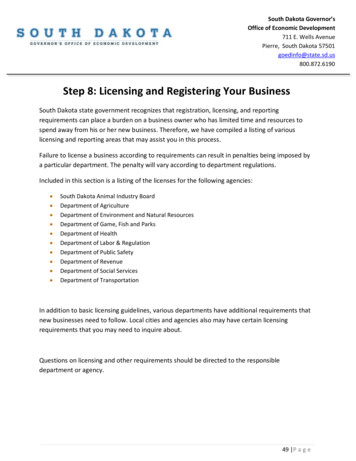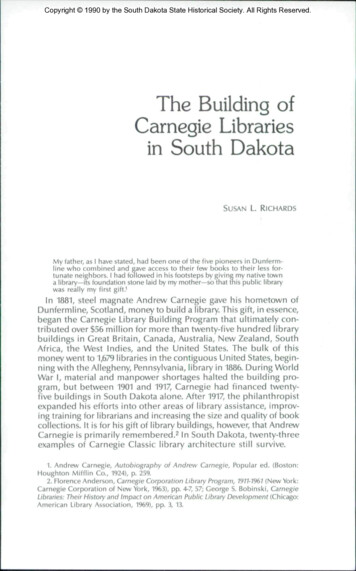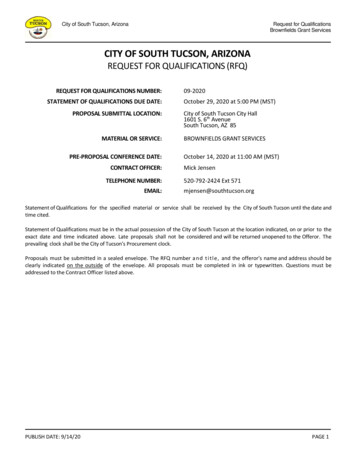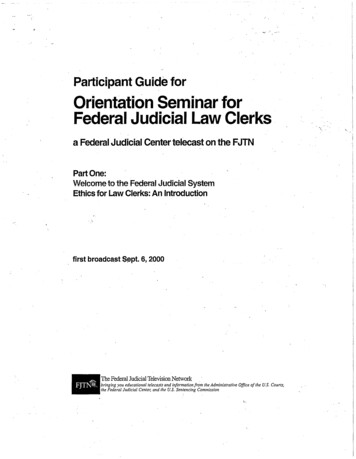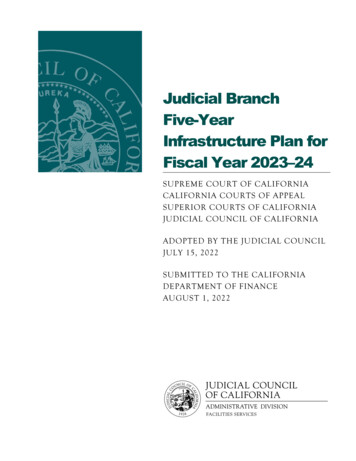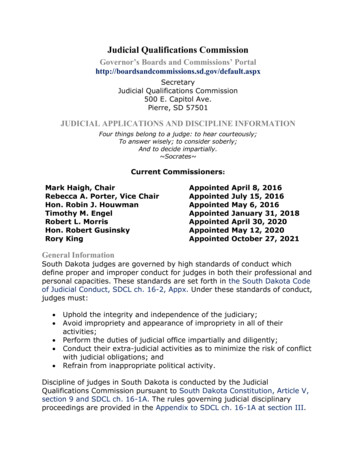
Transcription
Judicial Qualifications CommissionGovernor’s Boards and Commissions’ spxSecretaryJudicial Qualifications Commission500 E. Capitol Ave.Pierre, SD 57501JUDICIAL APPLICATIONS AND DISCIPLINE INFORMATIONFour things belong to a judge: to hear courteously;To answer wisely; to consider soberly;And to decide impartially. Socrates Current Commissioners:Mark Haigh, ChairRebecca A. Porter, Vice ChairHon. Robin J. HouwmanTimothy M. EngelRobert L. MorrisHon. Robert GusinskyRory ppointedAppointedApril 8, 2016July 15, 2016May 6, 2016January 31, 2018April 30, 2020May 12, 2020October 27, 2021General InformationSouth Dakota judges are governed by high standards of conduct whichdefine proper and improper conduct for judges in both their professional andpersonal capacities. These standards are set forth in the South Dakota Codeof Judicial Conduct, SDCL ch. 16-2, Appx. Under these standards of conduct,judges must: Uphold the integrity and independence of the judiciary;Avoid impropriety and appearance of impropriety in all of theiractivities;Perform the duties of judicial office impartially and diligently;Conduct their extra-judicial activities as to minimize the risk of conflictwith judicial obligations; andRefrain from inappropriate political activity.Discipline of judges in South Dakota is conducted by the JudicialQualifications Commission pursuant to South Dakota Constitution, Article V,section 9 and SDCL ch. 16-1A. The rules governing judicial disciplinaryproceedings are provided in the Appendix to SDCL ch. 16-1A at section III.
The Judicial Qualifications Commission receives, investigates and evaluatesallegations of judicial misconduct. Although the Judicial QualificationsCommission reviews complaints about judges, it is an independent entity,separate from the South Dakota Judicial Branch.The Commission on Judicial Qualifications consists of seven members: Two judges of the circuit court, elected by the judicial conference;Three members of the bar practicing law in this state, no more thantwo of whom may be of the same political party, appointed by amajority vote of the state bar commissioners; andTwo citizens who are not of the same political party, appointed by theGovernor.The term of office for a commission member is four years. No person mayserve more than two terms as a member of the commission.Filing a Judicial ApplicationJudicial announcements are published in the State Bar Newsletter.Applications may be obtained from either the UJS website or from theSecretary of the Commission. The commission shall require completion of aquestionnaire which shall include questions relating to the background andqualifications of the applicant, a waiver of confidentiality of all materialsnecessary to adequately investigate each applicant, including, but notlimited to, disciplinary records of the South Dakota State Bar DisciplinaryBoard, any other bar association disciplinary records, and recordsmaintained by any law enforcement agency. The investigation will beconducted in a professional manner but may not be entirely confidential.There may be additional investigations and contacts made by JQC membersif deemed appropriate. In addition to the application, an applicant will berequired to submit two examples of legal articles, books, briefs, or otherlegal writings, which reflect his/her personal work. Finally, a credit reportwith credit score not more than 30 days old will need to be submitted.Thereafter, Commission will schedule interviews and will interview allcandidates. By majority vote, the commission shall select two or morequalified persons to fill each judicial vacancy from the list of those personsinterviewed who meet the requirements of the South Dakota Constitution,these Rules, and all other legal requirements for the judicial office.The names of such nominees selected by the commission shall be submittedto the governor in alphabetical order along with a copy of all investigative
information and documents relating to each nominee.Filing a ComplaintThe procedure for filing a complaint for misconduct against a judge in SouthDakota is described in SDCL ch. 16-1A, Appx.III(2).Please use the complaint form which may be downloaded from this site. Anyperson wishing to file a complaint against a judge should state the facts ofhis or her particular situation as clearly and as specifically as possible. Underthe rules, the complaint must allege facts which would demonstrate: A violation of the Judicial Code of Conduct (Appendix to SDCL ch.16-2)(see above);Willful misconduct in office;Habitual intemperance;Disability that seriously interferes with the performance of the judge’sduties; orViolation of any constitutional provisions or statutes or conduct that isprejudicial to the administration of justice and brings a judicial officeinto dispute.Complaints filed against judges must be written and may be directed to:SecretaryJudicial Qualifications Commission500 E. Capitol Ave.Pierre, SD 57501E-mail complaints are not allowed.If you choose to submit an anonymous complaint, your complaint may notbe able to be investigated by the Judicial Qualifications Commission if thecomplaint is incomplete or if more information is needed from you in orderto proceed.Investigation and HearingsThe Secretary of the Judicial Qualifications Commission will distribute thewritten complaint to all members of the Commission. You will receive noticefrom the Secretary that your complaint was received. Review andinvestigation of the complaint will be conducted according to the rulesgoverning judicial disciplinary proceedings.
Under these rules, the complaint may be forwarded to the judge complainedagainst. You will receive notice from the Secretary if this happens. The judgeis given ten days to respond, and you will receive a copy of the judge’sresponse and be given an opportunity to reply. The response and your replywill be provided to all Commission members.If the Commission decides to issue a private reprimand, you will receivenotice that no formal disciplinary action will be taken. A private reprimand isa written reprimand of the judge by the Commission. However, theCommission may proceed to formal disciplinary proceedings which mayinclude a hearing. You will be notified by the Secretary of the final outcomeof any formal disciplinary proceeding.The Commission dismisses unfounded complaints.Purpose for Judicial DisciplineThe purpose of a disciplinary action involving a judge is, first and foremost,to protect the public. Under the rules, disciplinary proceedings areconfidential until they reach the point of the Commission’s filing itsrecommendation with the Supreme Court or the accused judge requests thatthe matter be made public. The matter is also public if the disciplinaryinvestigation is based upon conviction of a judge for commission of a crimethat is a felony under state or federal law, or is one involving moralturpitude.An honest disagreement about the outcome of a case is not cause fordiscipline. A mistake or error of judgment is also not cause for discipline. Inthose matters, the litigants may file an appeal of their case in theappropriate court.Frequently Asked Questions1. Will my identity be revealed to the judge?Generally, yes. The Judicial Qualifications Commission notifies judgesabout complaints unless there is an overriding reason to withhold thisinformation.2. Will my complaint be made public?Usually, no, although a complaint may become public if the JudicialQualifications Commission files formal charges against the judge withthe Supreme Court or if the judge requests the matter be made public.
3. Will filing a complaint with the Judicial Qualifications Commissionchange the decision in my lawsuit?No. Judicial Qualifications Commission proceedings have no effect ondecision or appeals.4. Will my complaint automatically disqualify the judge from furtherinvolvement in my case?No. The Judicial Qualifications Commission will only review yourcomplaint to determine whether or not misconduct has occurred.Disqualification is determined in court proceedings by a judge.5. Does the Judicial Qualifications Commission act on all complaints?Yes. Every complaint is reviewed by the staff and the JudicialQualifications Commission.6. Should I delay any appeal until this request for disciplinary action isconcluded?No. The Commission reviews only questions of ethical conduct. It doesnot have authority to review the merits of a judicial decision. If thesubstance of your complaint is about the merits or outcome of yourcase or a particular ruling, you should talk with your attorney aboutthe proper course of action, including whether or not to file an appeal.If you seek to change the outcome of your case, discuss this with alawyer without delay.7. If my complaint is justified, will the Judicial Qualifications Commissiontell me how the judge was disciplined?Yes. At the close of the case you will receive a letter describing theaction taken.8. What are some examples of judicial misconduct?Some examples are: Improper courtroom demeanor or improper treatment of parties,counsel, witnesses, jurors, court staff and others.Failing to promptly dispose of judicial business.Conflict of interest.
Chemical abuse.Engaging in improper election campaign activities.Receipt of information about a case outside the presence of a party.Failure to be impartial.9. What if I think the judge’s ruling was wrong?A judge’s error in a decision or ruling – by itself – is not misconduct.Appeal may be the only remedy for such an error, or there may be noremedy. Orders as to custody, visitation and setting child support, aswell as fines and sentences in traffic or criminal cases – if not outsidethe parameters set by law – are generally within the discretion of thetrial court and are not usually matters for the Commission.The Commission does not have the authority to direct a judge to takelegal action, or to review a case for judicial error, mistake or otherlegal grounds. These functions are for the State’s appellate courts.Allegations stemming from a judge’s rulings or exercise of discretiondo not provide a basis for the Commission’s action, and personaldissatisfaction alone cannot be grounds for judicial investigation.10.What can’t the Commission do?The Commission is not an appellate court. The Commission’s authorityis limited by law to investigating the complaint and, if appropriate,disciplining the judge. The Commission does not have the authority toissue orders in any case, including ordering anyone to be releasedfrom jail, granting a new trial, disqualifying a judge from hearing acase, assigning a new judge to a case or granting or changing custody,visitation or child support orders. Neither the Commission nor its staffis authorized to give legal advice or respond to requests for assistancewith individual legal matters.Members of the Judicial Qualifications Commission and the South DakotaSupreme Court appreciate your interest in our state judges and the highstandards of professional conduct set forth for them by the South DakotaCode of Judicial Conduct.Links Circuit Judge ApplicationHistorical JQC StatisticsJQC Complaint FormJQC StatisticsJudicial Canons
prejudicial to the administration of justice and brings a judicial office into dispute. Complaints filed against judges must be written and may be directed to: Secretary Judicial Qualifications Commission 500 E. Capitol Ave. Pierre, SD 57501 E-mail complaints are not allowed. If you choose to submit an anonymous complaint, your complaint may not



